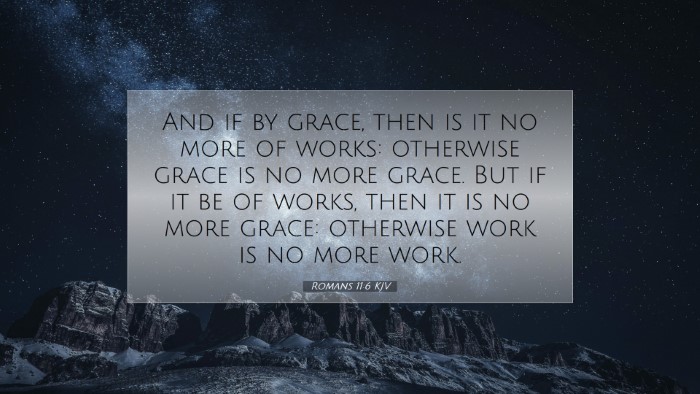Commentary on Romans 11:6
Verse: "And if by grace, then it is no longer of works; otherwise grace is no longer grace. But if it is of works, it is no longer grace; otherwise work is no longer work."
Context: This verse encapsulates critical theological tenets regarding grace and works, reinforcing the doctrine that salvation is a divine gift rather than a human achievement.
Overview of Key Themes
- Grace vs. Works: This verse powerfully contrasts the notions of grace and works, emphasizing their incompatibility in the context of salvation.
- Nature of Grace: Grace is depicted as unmerited favor, which cannot coexist with the concept of earning salvation through works.
- Theological Implications: This distinction has profound implications for understanding the nature of faith and the assurance of salvation.
Insights from Matthew Henry
Henry underscores the transformative nature of grace, which liberates believers from the burden of law and performance. He asserts that a grace-based salvation emphasizes God's sovereignty and mercy. No human effort can claim credit for what is purely a divine gift. Henry implies that when believers attempt to earn their salvation through works, they undermine the efficacy of grace and diminish the glory of God.
Insights from Albert Barnes
Barnes provides a detailed exposition of the implications of this verse, noting that grace represents God's initiative in salvation. He argues that the two systems—grace and works—cannot coexist; to embrace one necessitates the rejection of the other. Barnes suggests that every act of human merit as a means to secure favor with God ultimately distorts the Gospel message. According to Barnes, the assurance of salvation stemmed from its foundation in grace alone serves to relieve believers from the anxiety of performance-based acceptance before God.
Insights from Adam Clarke
Clarke emphasizes the radical nature of grace as a free gift. He elaborates on the semantic distinctions between 'works' and 'grace,' clarifying that works are efforts made by humans whereas grace is initiated by God without any prerequisites. Clarke also examines the historical context in which these ideas were presented, addressing the Jewish emphasis on the Law. He argues that understanding grace is essential for both Jews and Gentiles in coming to faith, as it levels the playing field in terms of merit before God. Clarke's interpretation invites reflection on how believers live out their faith in response to such grace.
Practical Applications
- Understanding Salvation: The doctrine of salvation by grace should encourage believers to deepen their understanding of their standing before God, which is secure in Christ and not contingent upon human efforts.
- Encouragement in Ministry: Pastors and ministers can find reassurance in the message of grace, knowing that their work is an outworking of gratitude and not a means to earn God's favor.
- Discussion Topics:
- The tension between faith and works in the life of a Christian.
- The implications of grace for ethical living and moral behavior.
- Comparative studies of grace in both Old and New Testaments.
Conclusion
Romans 11:6 serves as a profound reminder of the essential Christian teaching that grace is the unearned, unmerited favor of God. Through combined theological insights from distinguished commentators, we realize that grace liberates us from the constraints of legalism and performance. Pastors, students, and scholars alike are challenged to embrace this doctrine deeply, allowing it to transform both personal faith and communal expressions of worship and service. Thus, grace remains both the bedrock of our faith and the motivation for our works, reminding us that our greatest work is simply to rest in the grace that is freely given through Jesus Christ.


